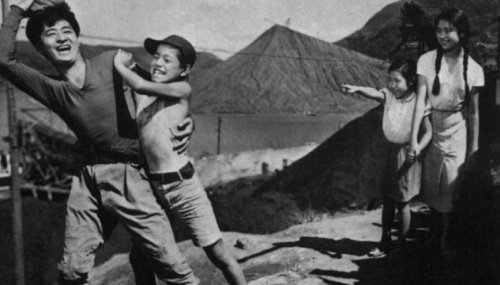|
 SHÔHEI IMAMURA SHÔHEI IMAMURA
Shohei Imamura (Tokyo, 15 September 1926) is a Japanese film director. Upon graduation from Waseda in 1951, Imamura began his film career working as an assistant to Yasujirō Ozu at Shochiku Studios on the films "Early Summer" (1951), "The Flavor of Green Tea over Rice" (1952) and "Tokyo Story" (1953). Imamura, however, was uncomfortable with the way Ozu portrayed Japanese society. While Imamura's films were to have a quite different style from Ozu's, Imamura, like Ozu, was to focus on what he saw as particularly Japanese elements of society in his films. "I've always wanted to ask questions about the Japanese, because it's the only people I'm qualified to describe," he said. He expressed surprise that his films were appreciated overseas.
Imamura left Shochiku in 1954 for a better salary at Nikkatsu. There he worked as an assistant director to Yuzo Kawashima and also co-authored the screenplay to Kawashima's "Sun in the Last Days of the Shogunate". Much later he edited a book about Kawashima, entitled "Sayonara dake ga jinsei da". In 1958, at Nikkatsu, Imamura made his first film, "Stolen Desire". With this early tale of traveling actors, Imamura indulged in some of the controversial and eccentric themes that were to mark his career as a filmmaker. Nikkatsu, however, was not enthusiastic about his more radical tendencies, and forced him to make a series of lighter films with which he was not happy. "Nishi Ginza Station" was a comedy based on a pop-song. "Endless Desire" and "My Second Brother" were similar light fare that did not satisfy Imamura.
His 1961 film, "Pigs and Battleships" was a wild and energetic story about the U.S. military base at Yokosuka and its relationship with lower elements of Japanese society. Shocked by the film and what they perceived as anti-American sentiments, Nikkatsu did not allow Imamura another project for two years. His next films, 1963's "The Insect Woman" and 1964's "Unholy Desire" showed no toning down of his style. With these three films, Imamura had established himself as a director with a strong and unique vision, and one of the leading figures of the Japanese New Wave.
Seeing himself as a cultural anthropologist, Imamura stated, "I like to make messy films", and "I am interested in the relationship of the lower part of the human body and the lower part of the social structure... I ask myself what differentiates humans from other animals. What is a human being? I look for the answer by continuing to make films". To more freely explore themes without studio interference, he established his own production company, Imamura Productions, in 1965. His first independent feature was a free adaptation of Akiyuki Nosaka's 1963 novel about life on the fringes of Osaka society, "The Pornographers". He next made his first venture into the documentary genre with 1967's "A Man Vanishes". His 1968 film "The Profound Desire of the Gods" investigates the clash between modern and traditional societies on a southern Japanese island.
One of Imamura's more ambitious and costly projects, this film's poor box-office performance led to a retreat back into smaller, documentary-like films for the next decade. "History of Postwar Japan as Told by a Bar Hostess" and "Karayuki-san, the Making of a Prostitute" were two of these projects, both focusing on one of his favorite themes: Strong women who survive on the periphery of Japanese society.
|






 SHÔHEI IMAMURA
SHÔHEI IMAMURA